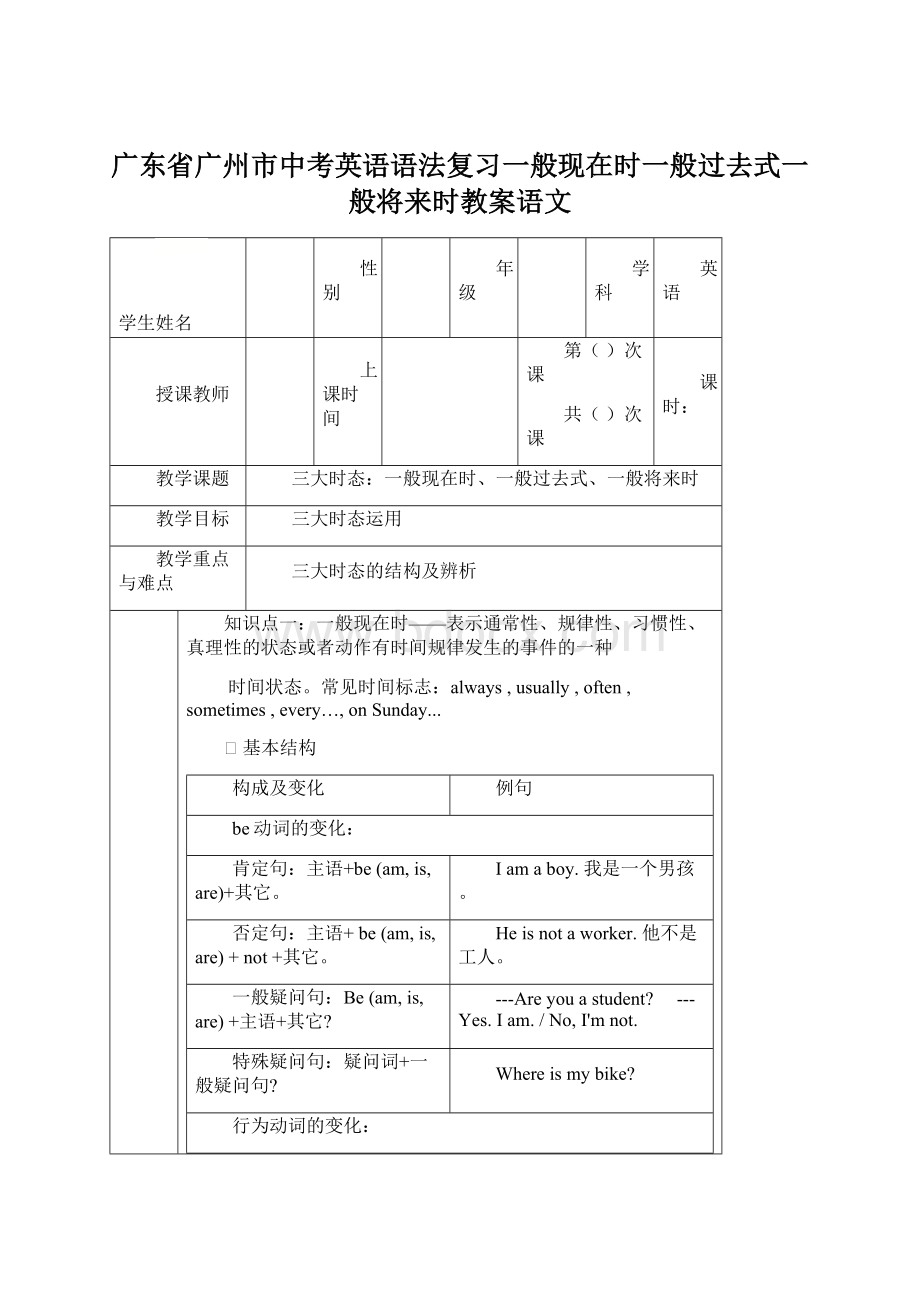广东省广州市中考英语语法复习一般现在时一般过去式一般将来时教案语文.docx
《广东省广州市中考英语语法复习一般现在时一般过去式一般将来时教案语文.docx》由会员分享,可在线阅读,更多相关《广东省广州市中考英语语法复习一般现在时一般过去式一般将来时教案语文.docx(22页珍藏版)》请在冰豆网上搜索。

广东省广州市中考英语语法复习一般现在时一般过去式一般将来时教案语文
学生姓名
性别
年级
学科
英语
授课教师
上课时间
第()次课
共()次课
课时:
教学课题
三大时态:
一般现在时、一般过去式、一般将来时
教学目标
三大时态运用
教学重点与难点
三大时态的结构及辨析
知识点一:
一般现在时——表示通常性、规律性、习惯性、真理性的状态或者动作有时间规律发生的事件的一种
时间状态。
常见时间标志:
always,usually,often,sometimes,every…,onSunday...
v基本结构
构成及变化
例句
be动词的变化:
肯定句:
主语+be(am,is,are)+其它。
Iamaboy.我是一个男孩。
否定句:
主语+be(am,is,are)+not+其它。
Heisnotaworker.他不是工人。
一般疑问句:
Be(am,is,are)+主语+其它?
---Areyouastudent?
---Yes.Iam./No,I'mnot.
特殊疑问句:
疑问词+一般疑问句?
Whereismybike?
行为动词的变化:
1.当主语为第一,二人称及复数时,助动词为do
肯定句:
主语+动词原形(+其它)。
Weoftenplaybasketballafterschool.
否定句:
主语+don’t+动词原形(+其它)。
Wedon’tplaybasketballafterschool.
一般疑问句:
Do+主语+动词原形+其它?
---Doyouoftenplaybasketballafterschool?
---Yes,wedo./No,wedon't.
特殊疑问句:
疑问词+以do开头的一般疑问句?
Whatdoyouoftendoafterschool?
2.当主语为第三人称单数时,助动词为does
肯定句:
主语+动词三单式(+其它)。
Heswimswell.
否定句:
主语+doesn’t+动词原形(+其它)。
Hedoesn’tswimwell.
一般疑问句:
Does+主语+动词原形+其它?
---Doesheswimwell?
---Yes,hedoes./No,hedoesn't.
特殊疑问句:
疑问词+以does开头的一般疑问句?
Howdoesyourfathergotowork?
【注意】第三人称单数的动词变化规则(只有在第三人称为主语的肯定句中,动词才用三单式)
(1)多数动词直接加s:
runs,gets,likes,collects,takes,plays,climbs......
(2)结尾是s,x,sh,ch,o,前为辅音字母,结尾加es:
watches,teaches,goes,does,washes,dresses,brushes.....
(3)动词末尾y前为辅音:
将y改为i加es:
study→studies,fly→flies,carry→carries,cry→cries......
但在y前如果为元音则直接加s:
buys,says......
(4)不规则变化have和be动词:
have-has,be-am/is/are
v具体用法
1.表示经常的或习惯性的动作,常与表示频率的时间状语连用。
时间状语:
always,usually,everymorning/night/evening/day/week/year,often,sometimes,twiceaweek,seldom,never......
例:
Ileavehomeforschoolat7:
00everymorning.我每天早上7点左右离开家去学校。
2.描述主语的状态、性质、特征、能力等,目的是为了“描述现阶段的动作或者状态”。
例:
Idon’twantsomuch.我不想要太多。
WangAnwritesgoodEnglishbutdoesn'tspeakwell.王安英语写得很好但是说的不好
3.陈述客观真理,客观存在,科学事实,或格言、谚语。
例:
Theearthmovesaroundthesun.地球绕着太阳转。
ShanghailiesintheeastofChina.上海市在中国的东部。
4.在一些情况下,一般现在时能用来表示将来时。
1)谓语动词是:
come,go,arrive,leave,start,begin,return,live,fly等,可以表示将来发生的动作。
例:
Thetrainleavesatsixtomorrowmorning.火车明天早上六点开。
---Whendoesthebusstart?
公共汽车什么时候开?
---Itstartsintenminutes.十分钟后。
2)在时间或条件从句中,一般要用一般现在时表示将来(主将从现),常见引导词:
if,when,assoonas。
WhenBillcomes,askhimtowaitforme.比尔来时,请他等我。
I’llwritetoyouassoonasIarrivethere.我一到那儿就给你写信。
Wewillhaveapicnicifitdoesn’traintomorrow.如果明天不下雨,我们将去野餐
【课堂练习】
一、用所给动词的正确形式填空
1.---What_______thestudents_________(have)?
---Theyhavesomepens.
2.---How______Linda________(go)toschool?
---Shegoestoschoolonfoot.
3.He__________________(notspeak)English.He___________(speak)Chinese.
4.---______they________(watch)TVonSundays?
---Yes,they______.
5.Myfatherandmother___________________(notread)newspapersonSaturday.
6.---What_________he________(have)?
---He________(have)atoyplane.
7.Mymother____________________(notlike)English.She_______(like)Chinese.
8.---_________you_________(go)toschoolbybus?
---No,I________(go)toschoolbycar.
9.MissWang_________(swim)everyday.
10.I________(like)English.Tom_____________________(notlike)English.
11.Heoften___________(have)dinnerathome.
12.Tommy__________(be)inClassOne.
13.We___________________(notwatch)TVonMonday.
14.Nick_________________(notgo)tothezooonSunday.
15._________she___________(like)theSportsMeeting?
二、根据要求改写下列句子。
1.Mydogrunsfast.
否定句:
一般疑问句:
2.Mikehastwolettersforhim.
一般疑问句:
否定句:
3.IusuallyplayfootballonFridayafternoon.
否定句:
一般疑问句:
划线提问 :
4.SuYangusuallywashessomeclothesonSaturday.
否定句:
一般疑问句:
划线提问:
5.Mingmingusuallywaterstheflowerseveryday
否定句:
般疑问句:
划线提问:
6.Tomdoeshishomeworkathome.
否定句:
一般疑问句:
划线提问:
3、单项选择。
1. _____ you have a book?
A. Do B. Are C. Is D. Have
2. They _________ on a farm.
A. working B. is work C. work D. is worked
3. Does Peter like to watch TV?
__________.
A. Yes, he like B. No, he doesn't C. Yes, he'd like D. No, he likes
4. She doesn't __________ her homework in the afternoon.
A. doing B. to do C. does D. do
5. How ____________ Mr. Brown ___________ to America?
A. do,go B. is,go C. does,go D. does,goes
6. Where's my camera?
I____________ it.
A. am not finding B. am not seeing C. can't find D. can't look at
7. How ___________ he go to work?
He ___________ to work by bike.
A. does go B. do;goes C. do go D. does;goes
8. ______ you usually late for school?
No, _____________.
A. Do I am B. Does not C. Are I'm not D. Are I aren't
9. _____ she _____ home at six every day?
A. Is , leave B. Does , leave C. Is , leaves D. Does , left
10. Mr. Yang ____________ English this term.
A. teaches our B. teaches us C. teachs us D. teachs our
11.Ifit________tomorrow,wewillhaveapicnic.
A.doesn’trainB.won’trainC.willrainD.don’train
12.Thesun_______intheeast.
A.willriseB.riseC.risesD.Rose
知识点二:
一般过去时——表示过去某个时间里发生的动作或状态、过去习惯性、经常性的动作、行为。
用动词的过去式表示,常和表示过去的时间状语连用,如:
yesterday,last night,
in+过去的年份,twodays ago,before等。
v基本结构
构成及变化
例句
be动词的变化:
肯定句:
主语+be(was,were)+其它。
Iwasastudent.我是一个学生。
否定句:
主语+be(was,were)+not+其它。
Hewasnotaworker.他不是工人。
一般疑问句:
Be(Was,Were)+主语+其它?
---Wreyouastudent?
---Yes.Iwas./No,Iwasn’t.
特殊疑问句:
疑问词+一般疑问句?
Wherewasmybike?
行为动词的变化:
肯定句:
主语+动词的过去式。
IwatchedafilmlastSunday.
否定句:
主语+didn’t+动词原形。
Ididn’twatchafilmlastSunday.
一般疑问句:
Did+主语+动词原形?
---DidyouwatchafilmlastSunday?
---Yes,Idid./No,Ididn’t.
特殊疑问句:
疑问词+以did开头的一般疑问句?
WhatdidyoudolastSunday?
【注意】动词过去式变化规则:
1.规则动词的过去式
(1)一般在动词原形末尾加–ed:
helped,looked,played,worked,listened……
(2)结尾是辅音字母+不发音-e,加–d:
lived,hoped,use---used,like---liked,tasted,loved,closed....
(3)双写末尾的字母,再加-ed:
stop---stopped,plan---planned......
(4)结尾是辅音字母+y,先变“y”为“i”,再加-ed:
study---studied,carry---carried,cry---cried,try---tried......
2.常见不规则动词过去式:
am,is-was,are-were,do-did,go-went,sit-sattell-told
see-saw,say-said,give-gave,swim-swam,get-got,find-found
come-came,have-had,eat-ate,take-took,run-ran,sing-sang,
put-put,read-read,make-made,write-wrote,draw-drew,drink-drank,
fly-flew,ride-rode,speak-spoke,sweep-swept,teach-taughtbuy-bought
stand-stoodthink-thought
一般现在时和一般过去时的否定句和一般疑问句变型步骤:
【1找】找句子中是否有be动词
(如果有be动词,否定句直接在相应be动词后加not;一般疑问句则直接把相应的be动词提前)
例:
Sheisateacher.【句子中有be动词---is】
Sheisnot(=isn’t)ateacher.【否定句在is后加not】
Issheateacher?
【一般疑问句则把is提前,句号变问号】
【2补】如果句子中没有be动词,则根据时态,否定句补don’t,doesn’t,didn’t,一般疑问句补Do,Does,Did
例:
Theyplayedbasketballyesterday.【时态是过去式,句子中没有be动词】
Theydidn’tplaybasketballyesterday.【否定句在主语后面补didn’t】
Didtheyplaybasketballyesterday?
【一般疑问句在主语前面补Did】
【3原形】don’t,doesn’t,didn’t,Do,Does,Did后面跟动词原形!
!
!
v具体用法
(1)一般过去时表示在过去某个特定时间发生,也可以表示过去习惯性、经常性的动作。
一般不强调动作的影响,只
说明的事情。
IhadawordwithJuliathismorning.今天早晨,我跟朱莉娅说了几句话。
Hesmokedmanycigarettesadayuntilhegaveup.他没有戒烟的那阵子,抽烟抽得可凶了。
(2)一般过去时常与表示过去的时间状语或从句连用,如:
yesterday(morning,afternoon,evening),atthatmoment
thedaybeforeyesterday,ago,thismorning/afternoon/evening,attheageof10(过去年龄段),justnow,atthattime
lastnight(week,Sunday,weekend,month,winter,year,century世纪),inthepast,in1993,once,before,when等等.
(3)表示过去连续发生的动作时,要用过去时。
这种情况下,往往没有表示过去的时间状语,而通过上下文来表示。
Theboyopenedhiseyesforamoment,lookedatthecaptain(船长),andthendied.
(4)表示在此之前一段时间内经常或反复的动作,常与always,never等连用。
Mrs.Peteralwayscarriedanumbrella.彼得太太过去老是带着一把伞。
(只是说明她过去的动作,不表明她是否常带着伞。
)
比较:
Mrs.Peteralwayscarriesanumbrella.彼得太太总是带着一把伞。
(说明这是她的习惯,表明她仍然还习惯总带着一把伞)
(5)如果强调已经终止的习惯时要用usedtodo(过去常常做,而现在不那样做了)
Heusedtodrinkalcohol.他过去喝酒。
(意味着他不喝酒了。
喝酒这个动作终止了)
Iusedtotakeawalkinthemorning.我过去是在早晨散步。
(意味着不再早晨散步了)
Eddleboughtabicyclethreedaysago.Eddle在三天以前买了一辆自行车。
比较:
Itookawalkinthemorning.我曾经在早晨散过步。
(只是说明过去这一动作)
(6)有些句子,虽然没有表示过去确定时间的状语,但实际上是指过去发生的动作或存在的状态的话,也要用过去时,
这一点,很多学生往往出错,要特别注意!
Ithoughtyouwereill.我以为你病了呢。
(这句话应是在说话之前,我以为你病了。
但是我知道现在你没病)
【课堂练习】
一、用所给动词的适当形式填空
1.TomandMary___________(come)toChinalastmonth.
2.Mike______________(notgo)tobeduntil12o’clocklastnight.SoI_______(get)uplate.
3.Mary__________(read)Englishyesterdaymorning.
4.There_________(be)noonehereamomentago.
5.Ilistenedbut___________(hear)nothing.
6.ShewatchesTVeveryevening.Butshe_____________(notwatch)TVlastnight.
7.________yourfather________(go)toworkeverydaylastyear?
8.—Whattime_______you_______(get)toBeijingyesterday?
—We__________(get)toBeijingat9:
00intheevening.
9.What__________(make)himcry(哭)justnow?
10.There____________(be)atelephonecallforyoujustnow.
11.There__________(be)notenoughpeopletopickapplesthatday.
12.Didshe________(have)supperathome?
2、句型转换。
1.Lucydidherhomeworkathome.(改否定句)
Lucy______________________herhomeworkathome.
2.Hefoundsomemeatinthefridge(冰箱).(变一般疑问句)
___________he_____________________meatinthefridge?
3.Shestayedthereforaweek.(对划线部分提问)
_______________________________she__________there?
4.Therewassomeorangeinthecup.(变一般疑问句)
_________there___________orangeinthecup?
5. Thomas spent RMB 10 on this book. (否定句) Thomas______ _____RMB 10 on this book.
6. My family went to the beach last week. (划线提问)
________ ________ ________ family _______ last week?
7. Sally often does some reading in the morning. (否定句)
Sally _______ often ______ some reading in th